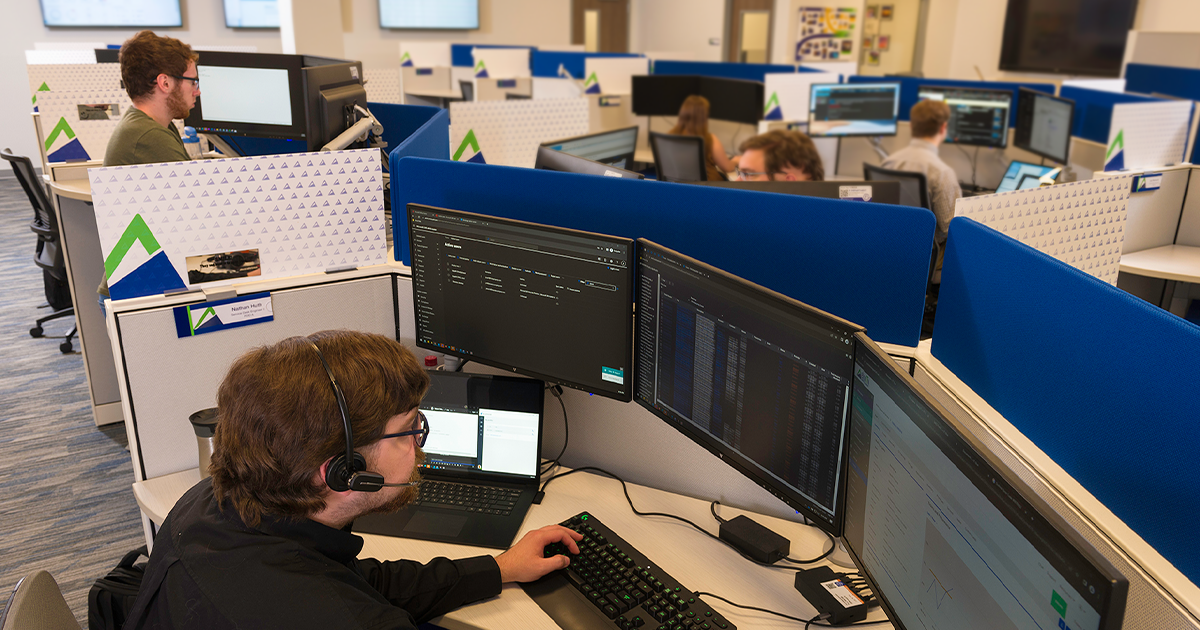Switching from a traditional land line to a Unified Communications system can be scary. But it doesn’t have to be. When your system prioritizes security, you’ll be better prepared against incoming cyberthreats trying to access your data. Because secure Unified Communications are essential to keep your organization running smoothly whether your staff works in-office, hybrid or remote.
Common Threats Aimed Toward Unified Communications Systems
Cyberthreats are evolving every day. And not every Unified Communication system is the same. We suggest that you take a closer look at the security protocols put in place by a Unified Communication provider before making a leasing decision.
One way to do this is to ask how the provider will help to protect your organization against the most common types of Unified Communication cyberthreats, such as:
- Distributed Denial of Service Attacks (DDoS) – DDoS attacks flood your Unified Communications system with messages or calls. The goal of the attack is to overload the system resulting in lost connections and service outages. While some attackers request a ransom to stop the attack, others may use a DDoS attack as the first step of a larger attack designed to steal your data.
- Theft of Service – Attackers attempt to access your phone service and use it to make scam calls to others. This type of attack can include legal ramifications, as you may need to prove to others that your system was compromised and that you were not the source of the scam calls. Lengthy legal battles can result from this type of attack.
- User or System Vulnerabilities – How will the platform promote strong Unified Communications security protocols to reduce user and system vulnerabilities? Unsecured devices, weak passwords or not using multifactor authentication can put your system at risk for a cyberattack. Also, ask your Unified Communications provider about their data center security practices to ensure that they are on top of compliance standards and defense updates.
- Phishing and Malware – Many attacks start as phishing (hacker pretends to be someone you know and asks for private information like a password) or malware (creeps in through an unsecure WiFi network and sends confidential data back to the hacker) scams.
When you are aware of the ways a hacker may attack your system, you can proactively strengthen your defenses and reduce your chances of a data breach.
How to Better Safeguard Against Unified Communications Threats
The most effective way to safeguard against threats aimed at your Unified Communications system is to work with an expert provider who offers a platform geared toward secure communications.
Here’s seven points that you and your Unified Communications provider should include as a part of your security plan to minimize the potential impact of cyberattacks.
1. Full Data Security Through Access Control and Encryption
You need to count on encrypted emails, files, video conferencing and voice calls. Make sure your provider uses industry-standard protocols, such as TLS, SSL, and WebRTC, to keep outsiders away from your confidential data.
2. Server-Side and Client-Side Backups
Never fear losing your data in the event of an outage or sudden emergency. A prepared Unified Communications provider backs up your data on servers in multiple locations. In addition, your administration portal should allow you to restore past versions of a file or prevent permanent deletion by unauthorized users.
3. Endpoint Protection Across Devices
Email services require full spam, virus and malware protection that instantly receives the latest updates from your provider. Furthermore, endpoint detection and response capabilities have processes to respond immediately to any suspicious activity on any kind of device.
4. Identity Protection Protocols
Administrators must be able to select end user access permissions. And administrator level password management should be simple and straightforward. In addition, administrators should be able to create organization-wide rules for password strength and expiration.
5. Complete Infrastructure Security
Your provider should have both physical and digital security for its data centers. These security practices should include employee background checks, restricted server access, 24/7 on-site security guards, closed-circuit television and internet service provider redundancy.
6. Data Control and Privacy
A comprehensive data policy ensures you can do international business without violating the compliance standards of key markets in the U.S. and European Union. For example, if a private cloud is necessary for customized security, you should be able to request this feature as a part of your Unified Communication system.
7. Continuous Security Management
Automatic logs, advanced analytics and real-time notifications help you and your provider quickly identify and address any threats. Behind the scenes, your provider should also conduct penetration testing and code reviews to eliminate any additional vulnerabilities.
Unified Communications with Comprehensive Security
Say “hello” to Unified Communications. With Managed Voice Services, you’ll enjoy seamless communication and collaboration in a system that is focused on security. We’re ready to help your staff communicate wherever their day takes them. Contact Gordon Flesch Company to learn more about our tailored, all-in-one communications solutions that bring your coworkers and customers, together.






 Addressing Security Concerns About Managed Voice Services featured image">
Addressing Security Concerns About Managed Voice Services featured image">



